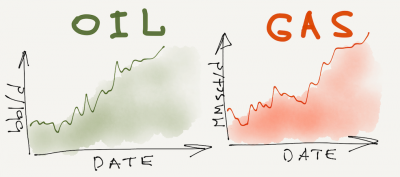Petroleum Engineering
Contents
Petroleum Engineering
Petroleum Engineering is a process of maximizing oil and gas production.
The oil and gas companies apply Petroleum Engineering in gas and oilfields to maximize wells and reservoirs production by identifying and closing performance gaps by Gap Analysis.
Petroleum Engineering allows to produce gas and oil wells and reservoirs at their potential in a most economical way while achieving maximum recovery.
New Petroleum Engineering Workflow
- Assess the current gas for oilfield performance. What is the current oil and gas production? Get and organize available oil and gas production data.
- Calculate the Production Potential and identify the performance gaps in a form of Enhancement List.
- Identify, rank and execute the Enhancements. Close the performance gaps.
Petroleum Engineering Technology
- Nodal Analysis
- Artificial Lift
- Waterflooding
Petroleum Engineering Career Advice
Advice on managing and being more successful with your Petroleum Engineering Career[1]. This is a useful career advice for for the student who is doing his petroleum engineering degree in a school, college, university or doing an internship. This is also helpful for the practicing engineer as a reference and a source for new ideas to make a difference on their petroleum engineering job and to increase salary.
- Calculate Potential and be a Performance Engineer
Performance is defined as the quality of results compared to potential. Therefore, for any endeavor you undertake, if you want to speak about its performance you must know its potential. Calculate the potential whenever possible and determine the performance gap by comparing actual results with potential[1].
- Stop Complaining about No Data
You should practice showing value added opportunities with the data that is available. Special or additional data is justified on an as needed basis. If more data is needed then show what opportunity is created and how a decision can be made by collecting the data[1].
- Focus on Opportunities and Execution
Look first for the "quick-hit" opportunities. Focus on action not studies. Organize the identified opportunities on a enhancement list, calculate potential and rank them based on performance gap. Make a plan to close the performance gaps based on the opportunities identified, execute the plan and track the results. Engineers who work on opportunities develop a trait of making quicker decisions and accelerating the tempo of the organization, which translated into better performance[1].
- Know-How or Technology what is most differential?
For the service companies its technology, for the oil companies its know-how. Work to develop individual know-how and expertise in your discipline. This is done by deliberately practicing your trade at ever increasing levels of difficulty. Push the limits of your knowledge and skills, routinely, and look for feedback from colleagues, management and professional societies[1].
Petroleum Engineering Job Description
Typical PE JD
petroleum engineering requirement

